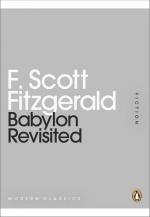|
This section contains 360 words (approx. 1 page at 400 words per page) |

|
Gallo, Rose Adrienne. F. Scott Fitzgerald, Modern Literature Monographs, Frederick Ungar Publishing, 1978, pp. 101-5.
Gallo argues that Fitzgerald hints that Charlie has not completely rejected his past alcoholic life and praises Fitzgerald's "brilliant evocation of place."
Lehan, Richard. "The Romantic Self and the Uses of Place in the Stories of F. Scott Fitzgerald," in The Short Stories of F.
Scott Fitzgerald: New Approaches in Criticism, edited by Jackson R. Bryer, University of Wisconsin Press, 1982, pp. 3-21.
Lehan emphasizes Fitzgerald's fusion of individual experience and the larger "spirit of the times" in the story. Charlie's dissipation is dramatized as being inseparable from the dissipation of his age, and the "note of loss" that surrounds Charlie's predicament at the story's conclusion reflects Fitzgerald's theme throughout his fiction that his protagonists' tragedies reflect the larger events of society around them.
Mangum, Bryant. "F. Scott Fitzgerald," in Critical Survey of...
|
This section contains 360 words (approx. 1 page at 400 words per page) |

|




